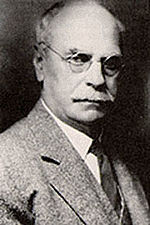Edwin Hall
| Edwin Hall | |
|---|---|

Edwin Herbert Hall (1855-1938)
|
|
| Born | November 7, 1855 Gorham, Maine, United States |
| Died | November 20, 1938 (aged 83) Cambridge, Massachusetts, United States |
| Nationality | American |
| Fields | Physicist |
| Institutions | Harvard University |
| Alma mater |
Johns Hopkins University Bowdoin College |
| Doctoral advisor | Henry Augustus Rowland |
| Known for | Hall effect |
Edwin Herbert Hall (November 7, 1855 – November 20, 1938) was an American physicist who discovered the "Hall effect". Hall conducted thermoelectric research at Harvard and also wrote numerous physics textbooks and laboratory manuals.
Hall was born in Gorham, Maine, U.S.. Hall did his undergraduate work at Bowdoin College, Brunswick, Maine, graduating in 1875. He was the principal of Gould Academy in 1875–1876 and the principal of Brunswick High School in 1876–1877. He did his graduate schooling and research, and earned his Ph.D. degree (1880), at the Johns Hopkins University where his seminal experiments were performed.
The Hall effect was discovered by Hall in 1879, while working on his doctoral thesis in Physics. Hall's experiments consisted of exposing thin gold leaf (and, later, using various other materials) on a glass plate and tapping off the gold leaf at points down its length. The effect is a potential difference (Hall voltage) on opposite sides of a thin sheet of conducting or semiconducting material (the Hall element) through which an electric current is flowing. This was created by a magnetic field applied perpendicular to the Hall element. The ratio of the voltage created to the amount of current is known as the Hall resistance, and is a characteristic of the material in the element. In 1880, Hall's experimentation was published as a doctoral thesis in the American Journal of Science and in the Philosophical Magazine.
...
Wikipedia
